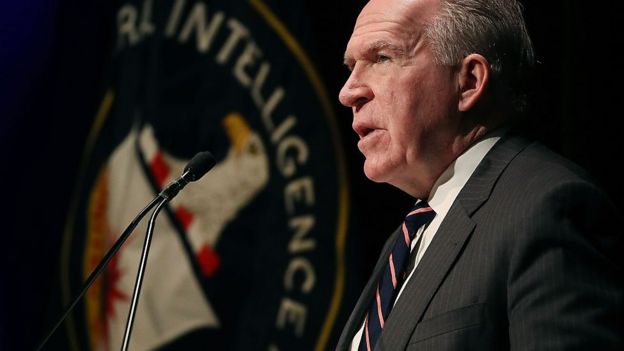More proof of Democrats’ seditious impulses.
April 21, 2017

John Brennan at the CIA
Although Russians may have aspired to influence the November election, the real election meddlers were Democrats in the Obama administration who conspired with foreign intelligence agencies against Donald Trump’s campaign, new media reports suggest.
The key player, we are learning, is the already infamous John O. Brennan but FBI Director James Comey also played a role. From January 2009 to March 2013, Brennan was Assistant to the President for Homeland Security and Counterterrorism, and then Director of the Central Intelligence Agency from March 2013 until Obama’s last day as president.
George Neumayr explains at the American Spectator how pro-Islam, pro-Communist Brennan appears to have masterminded the operation.
Seeking to retain his position as CIA director under Hillary, Brennan teamed up with British spies and Estonian spies to cripple Trump’s candidacy. He used their phony intelligence as a pretext for a multi-agency investigation into Trump, which led the FBI to probe a computer server connected to Trump Tower and gave cover to [then-National Security Advisor] Susan Rice, among other Hillary supporters, to spy on Trump and his people.
Drawing from a news article in the Guardian (UK), Neumayr adds:
Brennan got his anti-Trump tips primarily from British spies but also Estonian spies and others. The story confirms that the seed of the espionage into Trump was planted by Estonia. The BBC’s Paul Wood reported last year that the intelligence agency of an unnamed Baltic State had tipped Brennan off in April 2016 to a conversation purporting to show that the Kremlin was funneling cash into the Trump campaign.
Estonians were indeed tense after Trump’s seeming ambivalence about NATO on the campaign trail and the prospect that as president he might leave that former Soviet province at the mercy of Russian President Vladimir Putin. British spy agencies, too, were rife with Trump-haters.
The Guardian reports that Robert Hannigan, then-head of the British foreign surveillance service, Government Communications Headquarters (GCHQ), “passed material” to Brennan in summer 2016.
The claim about GCHQ involvement surfaced a month ago.
On March 16, Fox News contributor Andrew Napolitano accused GCHQ of working with the Obama administration to spy on Donald Trump, citing unnamed sources. The United States and United Kingdom are in fact parties to a multilateral intelligence cooperation pact. This five-way intelligence alliance among the U.S., U.K., Australia, New Zealand, and Canada is called Five Eyes (FVEY). It obligates the countries to work together in the area of signals intelligence (SIGINT). SIGINT is the gathering of intelligence related to communications between individuals (COMINT) and or from electronic signals not directly used in communication (ELINT).
When Brennan took over the CIA, he brought along fellow-travelers.
He dragged along “a raft of subversives and gave them plum positions from which to gather and leak political espionage on Trump,” Neumayr writes. He also “bastardized standards so that these left-wing activists could burrow in and take career positions. Under the patina of that phony professionalism, they could then present their politicized judgments as ‘non-partisan.’”
An official in the intelligence community told Neumayr that “Brennan’s retinue of political radicals didn’t even bother to hide their activism, decorating offices with ‘Hillary for president cups’ and other campaign paraphernalia.”
Neumayr cuts through the obsequious flattery the Guardian article bestows on its intelligence community sources, writing that things were so bad that Brennan’s CIA “operated like a branch office of the Hillary campaign, leaking out mentions of this bogus investigation to the press in the hopes of inflicting maximum political damage on Trump.”
“To ensure that these flaky tips leaked out,” Neumayr writes of the dubious pro-Trump plot by the Kremlin, “Brennan disseminated them on Capitol Hill. In August and September of 2016, he gave briefings to the ‘Gang of Eight’ about them, which then turned up on the front page of the New York Times.”
This was part of Brennan’s audition for the Hillary White House. Eager to retain his CIA post, the perennial excuse-maker for the Muslim Brotherhood also hated Trump for his alleged “Muslim ban,” which offended Brennan’s raging case of Islamophilia. In college Brennan spent a year in Cairo studying Arabic and taking Middle Eastern studies courses. He later was awarded a graduate degree in Middle Eastern studies.
Brennan and crew also helped to torpedo Mike Flynn, President Trump’s first short-lived National Security Advisor, because he “planned to rip up the Obama-era ‘reset’ with Muslim countries.” After reading the transcripts of Flynn’s calls with the Russian ambassador, “[t]hey caught him in a lie to [Vice President] Mike Pence and made sure the press knew about it.”
Not surprisingly, Brennan is one of the key reasons the Obama administration did so little to combat jihadists domestically. After Muslim lobbies supposedly put pressure on him, in 2011 Brennan purged all mentions of Islam and jihad from law enforcement counter-terror training materials. He assured those groups that the Obama administration’s worse-than-useless “Countering Violent Extremism” program had been ideologically purified and pretended the miniscule white-supremacist movement was just as big a threat as head-cutting Muslim savages.
Throughout his service in the Obama administration, Brennan regurgitated the regime’s dangerously idiotic talking points about Islam. It’s not like he needed convincing.
Brennan has spoken of "the goodness and beauty of Islam," which he calls "a faith of peace and tolerance." "The tremendous warmth of Islamic cultures and societies," he said, typically makes visitors from non-Muslim lands feel very "welcomed."
Brennan was the CIA’s station chief in Riyadh, Saudi Arabia. “I saw how our Saudi partners fulfilled their duty as custodians of the two holy mosques of Mecca and Medina,” he said. “I marveled at the majesty of the Hajj and the devotion of those who fulfilled their duty as Muslims by making that privilege — that pilgrimage.”
Former Marine John Guandolo, who worked in the FBI’s Counterterrorism Division, identified Brennan as an enemy operative who converted to Islam.
Brennan admitted he supported the Kremlin-funded Communist Party USA at the height of the Cold War, even voting for CPUSA presidential candidate Gus Hall in 1976. That fact alone should have instantly and permanently disqualified Brennan from all national security-related government posts.
FBI Director Comey’s hands are also not clean.
CNN reports that the FBI relied on the discredited “piss-gate” dossier to win approval from a secret court for permission to monitor the communications of Carter Page, a member of the Trump campaign. That Comey would act based on a dossier that is so ridiculous on its face that, among other things, it accused Trump of paying prostitutes to urinate on a hotel room bed in Moscow, suggests a strong desire on Comey’s part to hurt the Trump campaign.
Meanwhile, the Never Trumpers in the intelligence community can’t stop lying. Now they’ve fed more seeming nonsense to the media in order to keep the fake, faltering Trump-is-a-puppet-of-Putin story alive.
Citing unidentified American sources, Reuters is reporting that an official Russian think tank, the Moscow-based Russian Institute for Strategic Studies, drew up plans “to swing the 2016 U.S. presidential election to Donald Trump and undermine voters’ faith in the American electoral system.”
Three current and four former U.S. officials reportedly “described two confidential documents from the think tank as providing the framework and rationale for what U.S. intelligence agencies have concluded was an intensive effort by Russia to interfere with the Nov. 8 election.” Of course, it is not at all clear that U.S. intelligence agencies have concluded any such thing because no evidence, apart from the same anonymous statements recycled endlessly on CNN, has been made public.
The first document was “a strategy paper written last June that circulated at the highest levels of the Russian government but was not addressed to any specific individuals.” It urged the Kremlin to conduct “a propaganda campaign on social media and Russian state-backed global news outlets to encourage U.S. voters to elect a president who would take a softer line toward Russia than the administration of then-President Barack Obama,” all seven of these mysterious spooks reportedly said.
That Russia could even fantasize about having a bigger Russia-lover in the Oval Office than Barack Obama, the most pro-Russian U.S. president of all time, is difficult to fathom.
Obama advanced Russia’s interests in so many ways, according to Robert G. Kaufman. In 2009 he killed President Bush’s missile defense program for the Czech Republic, Hungary, and Poland. Then he renegotiated the New START nuclear arms agreement, which curbed the U.S. missile defense arsenal while letting the Russians add to theirs. In March 2012 Obama was caught on an open microphone telling then-Russian President Dmitri Medvedev to wait until after the upcoming election when he would be able to make even more concessions on missile defense. As Russia engaged in what one expert called the largest military buildup since the collapse of the Soviet Union, Obama flipped off Mitt Romney during a presidential debate. After Romney on the campaign trail referred to Russia as “without question, our No. 1 geopolitical foe,” Obama mocked him, saying “the 1980s are now calling to ask for their foreign policy back.” And Obama did virtually nothing but talk when Putin invaded Ukraine.
“Thanks to Obama's reset, Putin believes more than ever that he can achieve his consummate objective of reversing the outcome of the Cold War,” Kaufman adds. “No wonder Putin thought he could wage a cyber campaign to delegitimize the outcome of the 2016 presidential election.”
A second document from the institute that was drawn up in October counseled that Hillary Clinton was probably going to prevail in the election. That paper urged Russia to halt its pro-Trump propaganda campaign consisting of efforts by “state-backed media outlets, including international platforms Russia Today and Sputnik news agency, to start producing positive reports on Trump’s quest for the U.S. presidency, the officials said.”
Given that Russia Today and Sputnik are virtually unknown among American news consumers, it is hard to imagine anything they might broadcast or publish having much of an impact on an American election.
But it is becoming increasingly obvious that Russia didn’t do much, if anything, to influence the election.
John Brennan and others in the Obama administration used America’s taxpayer-funded national security apparatus to engage in espionage against an opposition presidential campaign, an incoming administration, and that administration’s transition team.
The whole campaign aimed at convincing Americans that President Trump was a tool of Russia was created by Democrats for their illicit purposes.
Almost every day new evidence emerges proving that point.


